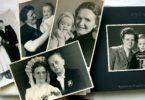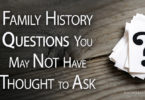Whether you’re doing serious genealogical research or just want to know, don’t forget to check with the older members of your family. That elderly great-aunt, your late grandmother’s youngest sister, would be a rich resource, for example. What you view as the black-and-white world of the past, she remembers in living color. An interview with an older family member is the ideal combination of spending family time and doing genealogy research. The recollections of living persons, influenced by the recordings of emotion and perspective are what infuse life into your family tree.
Record the Interview
Get the interview on video or audio, with your relative’s permission of course. That will free you from having to take notes. Also, prepare some questions to fill the gaps as your relative comes to the end of an episode of your family story. Here are some suggested interview topics:
- Ask your relative to fill in the gaps of your personal knowledge of family members. For example, what were the full names, dates, and places of birth of your relative’s immediate family members?
- Does your relative have old family documents, such as birth, marriage or death certificates, that you could borrow and copy?
- Is there an old family Bible in your relative’s possession? Family Bibles can be a stunning holographic resource. The family history written in front of the Bible often goes back generations.
- How about old family photos and albums? Has your relative clearly identified each person in the photos? If not, offer to return and help get the photos labeled and organized.
- Who was the oldest member of the family in the memory of your relative? What family stories and traditions stand out about that relative? Did he fight in the Civil War? Was she a “Rosie the Riveter” type?


Be Careful About Sensitive Matters
You may be able to come up with many more paths of inquiry, but here’s a word of caution: approach sensitive subjects (rumors of scandal, black-sheep stories, and so on) with tact and sensitivity. Instead of asking pointed questions, go for the open-ended ones.
Connecting the Dots
As you continue your search to find your place in the shade of your family tree, listening to the memories of older family members is a great way to connect the dots between your ancestors and you. Those dots, like the good that people do in their lives, as Shakespeare wrote, “is oft interred with their bones.” The good is what you’re after here because you are here as a living connection to the past. Gather your family history, and you’ll be doing your own descendants a great service.







